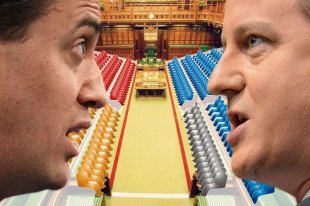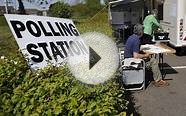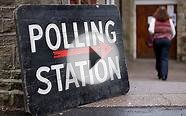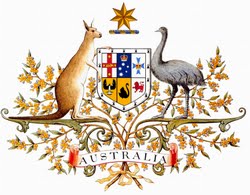General Election Voting system
 Does the electoral system really work in multi-party Britain?
Does the electoral system really work in multi-party Britain?
These figures show how unrepresentative Parliament is when compared to the popular vote. Here's just how different it would be:
- no, the Tory government would NOT have got a majority under proportional representation
- there would be 40 seats between Labour and the Tories, not 100
- Ukip would have 82 MPs not one
- the Greens would have 24 MPs, not one
What would the result have been under proportional representation?
It’s difficult to calculate because we don’t know how a PR system would change the way that people vote.
BUT, if you were splitting the share of the vote crudely between the parties, you’d end up with something more like this.
How MPs MIGHT be allocated
Figures correct at 10:45
Voting under proportional representation WOULD take the Tories out of control, but they would still be the biggest party. This is an estimation of how it would look under proportional representation.
| Party | Actual result | P.R. | Difference |
| Conservatives | 330 | 240 | -90 |
| Labour | 232 | 200 | -32 |
| Lib Dem | 50 | +42 | |
| SNP | 56 | 32 | -24 |
| Ukip | 82 | +81 |
The Greens would also see a huge increase from 1 to 24 MPs.
There's one catch with that
While Labour voters would relish the plummet in Tory votes, in reality, a set of results like this would mean that the Tories would still be the largest party. And they'd be likely to form a coalition with the likes of Ukip or even the DUP, not something that left-wingers would enjoy for five years.
The system we have now
First-past-the-post means you can get a lot of MPs with not much of a share of the vote.
There is a huge discrepancy between the SNP’s 56 seats and Ukip’s 1 seat. Yet Ukip have received 3.7 million votes, and the SNP 1.4 million.
The difference is even starker when you look at the DUP. They have recorded less than 200, 000 votes, but have 8 seats.
Let's take it blow by blow.
How people voted
Figures correct at 9:26
How MPs were allocated
Yep. We have an electoral system that can’t even allocate the MPs in the same order as the popular vote, let alone in proportion...
You might also like













 The Australian electoral system has evolved over the last 150 years of democratic government, with the Australian Parliament established by 1901. The present day federal parliament has a number of distinctive features including compulsory voting, with full-preference instant-runoff voting in single-member seats to elect the lower house, the...
The Australian electoral system has evolved over the last 150 years of democratic government, with the Australian Parliament established by 1901. The present day federal parliament has a number of distinctive features including compulsory voting, with full-preference instant-runoff voting in single-member seats to elect the lower house, the...